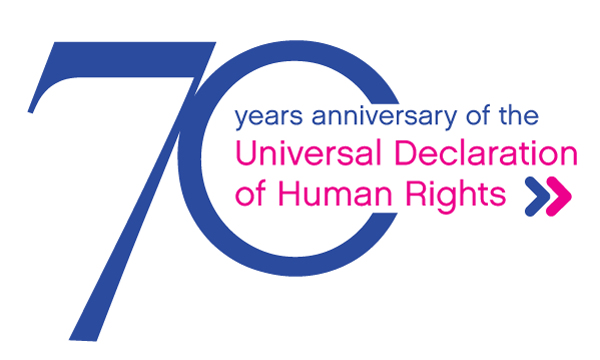‘Reiterating Our Commitment to Human Rights’: CCA General Secretary's Statement on 70th Anniversary of UDHR

Statement of the Christian Conference of Asia (CCA) General Secretary on the occasion of the
70th Anniversary of the adoption of the Universal Declaration of Human Rights:
'Reiterating Our Commitment to Human Rights'
Today, 10 December 2018 is the 70th anniversary of the adoption of the Universal Declaration of Human Rights (UDHR) by the General Assembly of the United Nations. The UDHR is a promise by States to uphold the equality and inherent rights of every human being. Its 30 articles were intended to be brought to life in a wide variety of ways; they are invariable and fundamental principles rooted deeply in cultures and traditions from across the world. The UDHR upholds the fundamental values which unite all humanity, and which together make up the single most important factor in ensuring rights and dignity. It calls for "a common standard of achievement for all peoples and all nations". Adopted on 10 December 1948, the UDHR became the starting point for the development of modern international human rights law. Over the years, it enabled awareness and interest in human rights among millions of people all over the world. The 70th anniversary of the UDHR is yet another milestone and an occasion to reflect on the significance of human rights. It is also an occasion to assess achievements and the challenges in applying the principles and provisions of the UDHR in a world where serious human rights violations continue to take place.
It is heartening that there have been numerous initiatives and positive achievements in the area of human rights protection during the past seven decades. Those measures include the adoption of the many human rights treaties at both the international and regional levels. Yet, people across the world are far from equals. Despite many progressive developments in upholding the values of human rights, to varying degrees, there still exist human rights violations in many parts of the world including in Asia. People suffer due to discrimination on the basis of ethnicity and religion; freedom of expression is curtailed; independence of the judiciary, democratic governance, rule of law, peace and security are threatened. Experience shows that many such problems in today’s world can be easily averted, if governments respect the economic, social, and cultural rights of their citizens by providing basic needs in life, as they are articulated in article 25 of the UDHR: everyone has the right to a standard of living adequate for the health and well-being, including food, clothing, housing, and medical care and necessary social services, and the right to security in the event of unemployment, sickness, disability, widowhood, old age or other lack of livelihood. All these factors remind us that in the spirit of human solidarity, we have a duty to stand up for the rights of others, as we can all take part in the active creation of the common good.
On this occasion, it is a matter of joy to remember proudly the profound contributions of three most prominent Asians among the drafters of the UDHR: Charles Habib Malik, a Lebanese academic, diplomat, and philosopher; Hansa Jivraj Mehta, an Indian independence activist and early feminist who was responsible for changing the language of the UDHR from "all men are created equal" to “all human beings”, highlighting the need for gender equality and arguing forcefully, and successfully, for a language which would make clear that women are equal in rights and dignity to men; and Peng Chun Chang, a Chinese academic, philosopher, human rights activist, and diplomat who argued what human rights were in non-Western perspectives and how they could be described in an international document. We remember them and salute in front of their memory.
Since its inception in 1957, the Christian Conference of Asia (CCA) has always been committed to promoting respect for human dignity, human rights, equality, and peace with justice. The UDHR was used as a tool for human rights education and advocacy by CCA through the two ecumenical platforms CCA had initiated and founded in early 1980s – the Asian Human Rights Commission and the Asia Legal Resource Centre. Both organizations initiated by CCA have become independent and spread their wings over the years; still making significant contributions to protect the rights and dignity of the marginalized and vulnerable people and communities in Asia. While CCA observes and reiterates the importance of human rights, and human dignity at all times and every context, on the occasion of the 70th anniversary of the adoption of the UDHR, CCA reaffirms its commitment to uphold the human dignity and protect the human rights of all people in the world. We reiterate our recommitment and support to all human rights defenders. We note with great disquiet all who have gone missing, were illegally arrested, detained, tortured, and were victims of extrajudicial killings by security forces with impunity, as a result of their human rights advocacy.
On this fervent occasion of the commemoration of the 70th anniversary of the human rights manifesto, we urge the governments in Asia to promote and respect the human rights of all, including people who are migrants, trafficked, refugees, stateless, differently abled and of a different gender. In its mission of ecumenical enabling of prophetic diakonia and advocacy, as well as peacebuilding efforts, CCA unfailingly engages in work that promotes dignity, equality, and justice as well as opposes the forces that destroy human dignity and intensifies any form of dehumanization.
The distinctly Christian perspective on human rights motivates and calls us to advocate for human rights, especially for the poor, the weak and the oppressed. The UDHR, a distinctive instrument, could be used effectively in human rights advocacy and protection. It is in this context that we encourage all sectors of society to join hands to fulfill the promises of the UDHR, especially enabling the people at large for the practical applications of the guidelines and principles enshrined in the human rights manifesto.

Mathews George Chunakara
General Secretary
Christian Conference of Asia
10 December 2018










